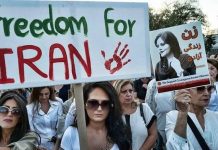Egyptian Columnist, Imad Al-Din Adib, Compares Iranian Nuclear Agreement To Munich Agreement
MEMRI/July 21, 2015 Special Dispatch No.6111
‘Imad Al-Din Adib, a columnist for the Egyptian daily Al-Watan, has harshly criticized what he called the “pathetic” agreement arrived at by the U.S.-led P5+1 and Iran, arguing that it allows Iran to produce a nuclear bomb after it expires and disregards Iran’s regional policy that harms its neighbors. According to Adib, the Obama administration is mistaken in its assessment that lifting sanctions on Iran will lead to democratization and political reforms in the country, because the resultant influx of cash to Iran will be channeled to increasing tensions in the region. He also compared the Joint Comprehensive Plan of Action with the 1938 Munich Agreement signed by British prime minister Neville Chamberlain and Adolf Hitler, adding that many historians viewed the Munich agreement as the cause of Hitler’s megalomania.
‘Imad Al-Din Adib (Source: Twitter.com/adeeb_emad)
Following are excerpts from Adib’s column:
“Many professors of modern history believe that British prime minister Chamberlain was the main reason for Hitler’s megalomania. These [professors] maintain that… it was Chamberlain, who always preferred a policy of containment and appeasement, and who refrained from stern policy and confrontation at all costs, that, by signing the pathetic [Munich] Agreement with Hitler, gave the latter [a sense] of power and a stubborn desire for control.
“History is [now] repeating itself; this pathetic agreement between Chamberlain and Hitler is back again, in the form of a nuclear agreement between Iran and the superpowers. The greatest powers have signed an agreement that reduces and slows Iran’s nuclear uranium enrichment [but] does not halt it, in return for $120 billion [to] Tehran.
“The astonishing thing, which no one has pointed out, is that even if Iran complies to the letter with the 85 sections of the agreement, the agreement itself, once its 10-year duration is up, allows [Iran] to produce a nuclear bomb in the 11th year. Iran, after 26 months of grueling negotiations, has sold ‘air’ to the superpowers.
“The main mistake in the Obama administration’s reasoning is its assessment that lifting the economic and trade embargo on Iran will lead to a revival of the entire Iranian economy, and thus to political reforms and a transition to democracy.
“What the American administration did not realize is that [Iran’s] clerical dictatorship will funnel this money to investment in political plans outside Iran, in conflict zones such as Lebanon, Syria, Yemen, Iraq, Bab Al-Mandeb [Straits], Africa, and Pakistan.
“The American administration [also] did not realize that the regime of clerics in Tehran, which is above the rule of experts, economists, and civil [leaders], has spent insane sums on all these extremist and terrorist programs in the region, as the Iranian economy plummeted in the shadow of an unprecedented international boycott. We must ask: If this is what they did in the shadow of this boycott, what will they do with this influx of funds?!
“Another strange thing is that the nuclear agreement includes not one single clause or reference to Iran’s conduct as a country in the region, or to its policy towards its neighbors.
“It is as if they told Iran: Take 120 billion [dollars] and do as you please.”[1]
Endnote:
[1] Al-Watan (Egypt), July 16, 2015.
Former Jordanian Information Minister, Saleh Al-Qallab: The Arabs, Because Of Their Helplessness, Are Responsible For Iran’s Expansion In The Region
MEMRI/July 21, 2015 Special Dispatch No.6110
In his June 13, 2015 column in the official Jordanian daily Al-Rai, former information minister Saleh Al-Qallab blamed the Arabs for Iran’s expansion in the region from Iraq to Syria, Lebanon, and Yemen. It is this helplessness and silence in the face of Iraq’s occupation by Iran, he wrote, that has led to the current situation, in which Iran is occupying several Arab countries. After occupying Iraq, Iran is now striving to divide Syria and to establish there a pro-Shi’ite mini-state, he said, and this could impact the entire region. He concluded by calling on the Arabs to foment internal wars in Iran in order to thwart its regional sectarian plans.
Saleh Al-Qallab (Source: Yemen-press.com, April 16, 2015)
The following are excerpts from Al-Qallab’s column:
“Despite the many important issues with which the Arabs are preoccupied, there is no justification for the fact that Syria is being torn apart in this way, as they watch from the sidelines… even though they know that the division of this central country will impact not [just] its neighbors, but the entire Arab region. If they do not act swiftly before time runs out, this collapse will have a domino effect…
“The Arabs, both nearby and distant, have shown grave weakness by distancing themselves from Iraq after it was occupied in 2003. Iran was the one who benefited from this, when it hastened to fill this vacuum until it gradually occupied that entire Arab country. [Today,] removing [Iran] from [Iraq] will involve a years-long effort, and require a unified Arab position, because those who have been harmed [by the Iranian occupation] include not only the Iraqi people, but the entire Arab ummah.
“Had the Arabs not remained silent regarding Iran’s expansion to Iraq and its occupation of it [which continues] to this day, Iran would not have been able to continue to expand and occupy Syria, Yemen, and Lebanon in the same way. The Iranians interpreted this [Arab] silence as impotence, and went so far as to speak of the subordination of four Arab capitals – Baghdad, Damascus, Beirut, and Sana’a – under the Iranian capital Tehran.[1]
“All the Arabs heard… Syrian Deputy Foreign Minister Faisal Al-Miqdad’s [June 13, 2015] boast that the Assad regime relied on support from Iran and its forces in order to maintain its steadfastness. It is clear that [Iranian] President Hassan Rohani’s statement that Iran would continue to support the Syrian regime to the end remains in force, and reverberates across the Arab [countries]. This support, which is frequently reiterated by Iran, is [actually] support for Iran’s [own] vital interests in that country and in the Arab region – not support for [the interests of] Syria or the Syrian regime. “Syria is marching towards division and disintegration. Bashar Al-Assad, who has submitted to Iran’s wishes… is clinging to his seat until the end, while the Syrian people, who have lost hundreds of thousands of their sons and whose cities, villages, and towns have all been destroyed, cannot agree to any compromise or solution that will leave this regime in place. This pulling in two opposite directions [by the regime and by the people] will ultimately lead to [Syria’s] division and to the emergence of the sectarian mini-state that the Iranians seek – one that complements the Hizbullah state and will reach from Damascus to Latakia…
“Therefore, in the absence of a serious Arab position to pressure Iran by causing it to be preoccupied with internal conflicts like those with which the Arabs were preoccupied during [the recent period, which was] the most difficult and dangerous period in their modern history, we will surely soon awaken [to a reality of] more than one Syrian mini-state, and, ultimately, find that our region has become a sectarian crazy-quilt. This is precisely what Israel wants and what it has aspired to from the time of its founding.”
Endnote:
[1] See MEMRI TV Clip No. 4530, “Iranian Analyst Mohammad Sadeq Al-Hosseini: Saudi Arabia Is on the Verge of Extinction; We Are the New Sultans of the Mediterranean, the Gulf, and the Red Sea,”September 24, 2014.




















